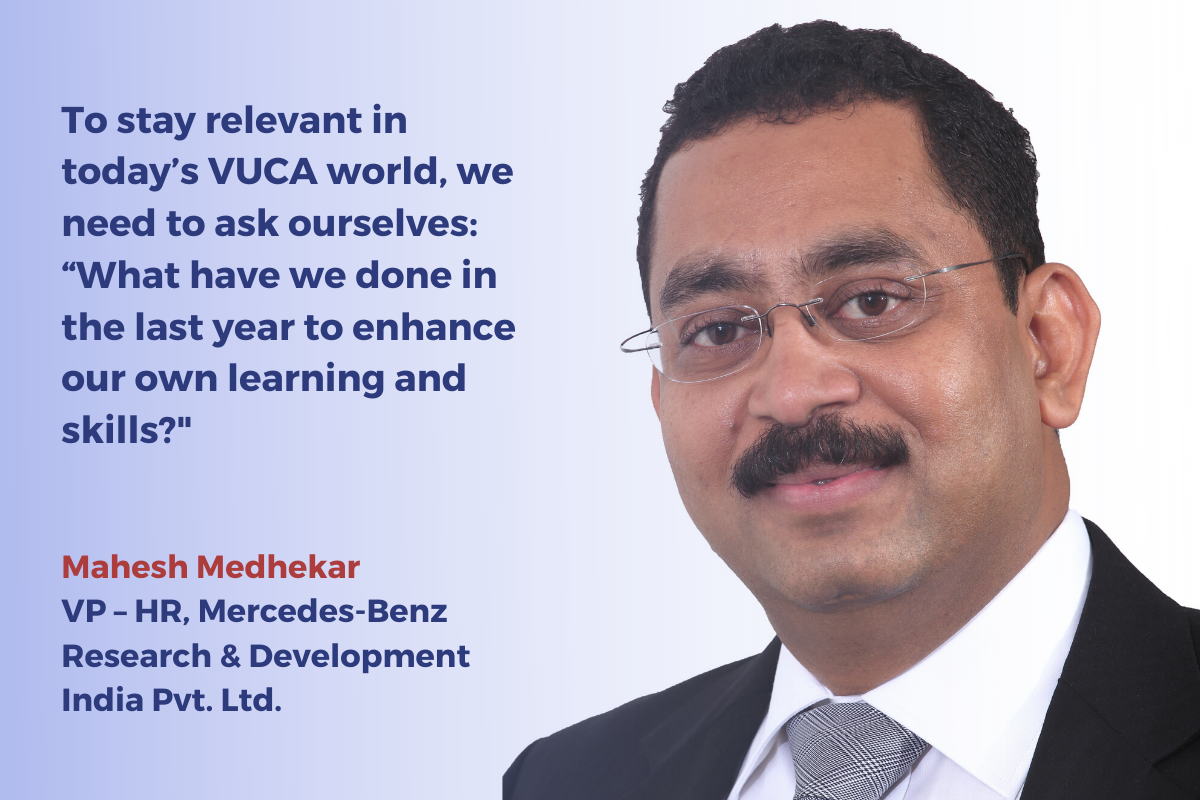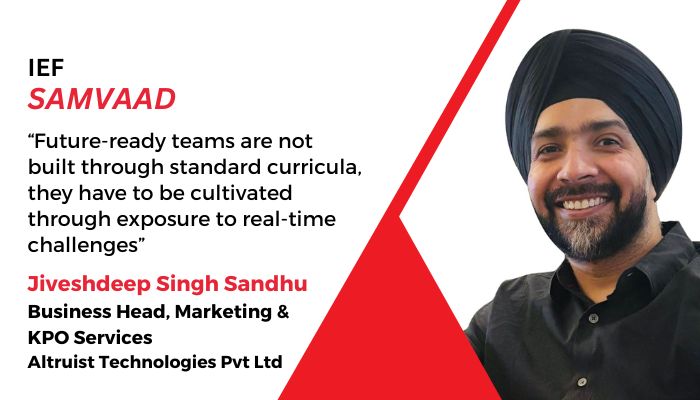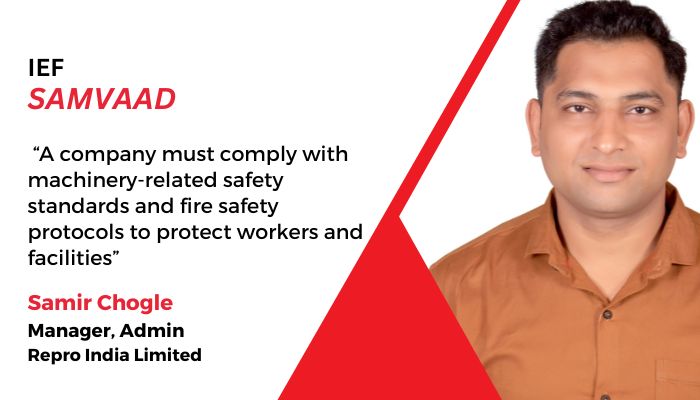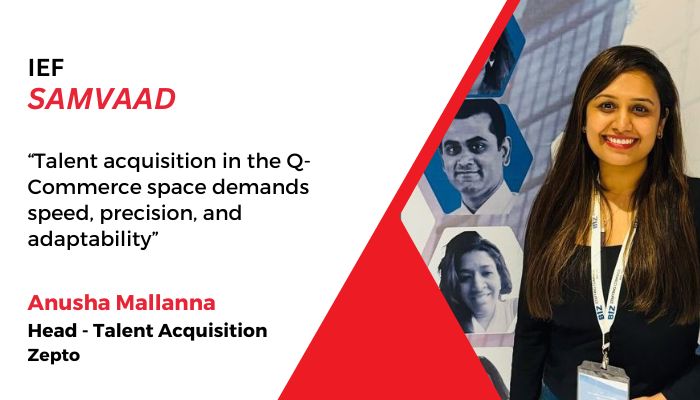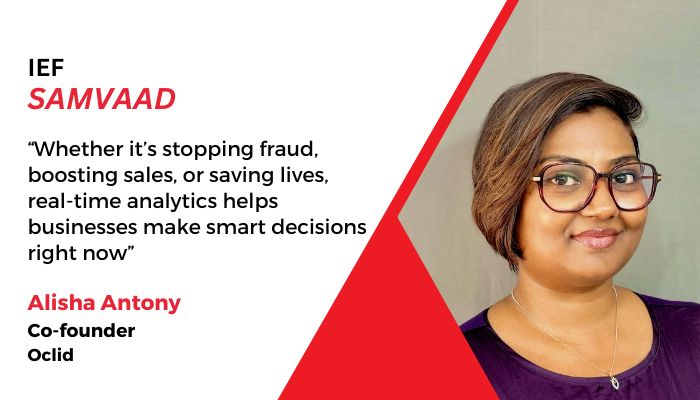Mahesh Medhekar, VP – HR, Mercedes-Benz Research & Development India Pvt. Ltd. firmly believes that following this principle would help HR professionals attract and retain the best talent
Q. Please tell us something about yourself.
I’ve been with Daimler for nearly 24 years. In that I have seen tremendous transformation of both Daimler in India and Mercedes-Benz Research and Development India (MBRDI). This has transformed me as an individual and made me a versatile professional. I have extensive experience in designing and executing talent strategies – making HR a real strategic partner for business which contributed to making MBRDI the largest R&D center of Daimler outside of Germany. My passion is to drive cultural transformation through leadership development initiatives with focus on digitalization in HR. Over the years, I have supported engineering and IT business by bringing the competence and cost advantage of India to Daimler Business Units.
Q. How important is deep domain expertise for HR professionals?
To lead the digital organization, HR leaders must be tech-savvy themselves, and need to be agile in their approach to be able to support the business needs. Keeping in mind current disruption to various business models, HR professions should take keen interest and develop their understanding of technical domains and what impact digital transformation would have on these domains. HR professionals with strong business acumen can support business growth and create value for the organization by linking strategy with talent.
Q. What’s been your success mantra?
I am always fascinated with the fact that we are always surrounded by people who have many good things in them. You have a choice to select and practice some of this good aspects. This has helped me in the initial 10 years of my career. Deep understanding of customer’s customer is the key for HR function which has helped me immensely in my role as an HR leader. Behavior based on strong values, being a source of inspiration and ability to positively influence people are some of the important leadership qualities.
Q. How can HR help create world class organizations in today’s context of evolving world of jobs?
HR should build and maintain a high quality corporate image with respect to HR practices, which will help them to attract talent. HR being the custodian of culture in the organization, the journey starts by instilling a corporate culture based on values. Values such as trust, transparency, humility and respect transform an organization into a high performance organization leading to successful implementation of business strategy.
The principle what I believe in is: “Human Resource is not the resource, but the resources that people have”. If every HR professional works with this belief, then attracting and retaining the best talent and ultimately becoming an employer of choice is much easier.
You might also be interested to read: ‘Most Of The Labor Laws Are Outdated And Need Amendments’
Q. In context of the future of work, what new roles do you see emerging in the HR function?
Digital transformation influenced our lives, changed business models and redefined jobs that demand new skills. The new age technologies of AI, DL, ML and Big Data Analytics are shaping our future of work. Artificial Intelligence is revolutionizing our life every single day. With this transformation, most of the routine HR functions require transformation, which means we need to think beyond automation and have real change in the way we function. Data scientist, data analyst, digital transformation officer, digital learning officer are some of emerging functions to analyze, reimagine and transform the HR processes that would integrate the new business model with millennial workforce.
Q. How should HR professionals prepare themselves to remain relevant?
HR leaders need to understand the impact of new technologies on their business and then see which technologies or processes need to the integrated in HR functions. To remain a strategic partner, HR should have a deep understanding of business and their changing needs. They need to engage business and review current management theories, leadership principles, and assessment methods to see their relevance in the digital age.
Q. How should leaders be developed?
Even though organizations consider leadership development as a priority, most of them are not effective developing leaders leaving more than 70% percent of leaders unprepared to lead their organization into the future. Leaders are not developed overnight. It takes time to identify, assess and develop tomorrow’s leaders. Identifying potential leaders and focusing on their leadership development to make sure that we are investing in the right people. Along with the technical competence, individual aspiration, capability and cope ability are equally important.
Leaders should be given clear understanding of the purpose of their organization. It is also important to review how leaders give purpose/orientation to their employees, especially when the strategy is not clear and there are conflicting or moving targets, which is obvious in the digital age.
Creating a culture of coaching where leaders act a good coaches is also an essential step for developing leaders. Coaching creates a culture which is based on trust, transparency and willing to give and receive critical feedback. Having a good mix of internal and external leadership development programs helps to establish a common understanding of corporate values, leadership principles, corporate strategy and future challenges of the organization.
Q. How can professionals remain employable till the age of retirement in today’s VUCA world?
To enable a high level of performance one has to consolidate knowledge, as well as ensure the application and transfer of knowledge. Learning is a continual process and it should not stop even under difficult constraints (organizational/personnel changes). To stay relevant in today’s VUCA world, we need to ask ourselves: “What have we done in the last year to enhance our own learning and skills?” Similarly, a leader should ask if his team has the necessary skills for handling their assignments successfully. In addition to the technical skills, one should also focus on personal skills and traits and seek critical and constructive feedback to develop them further. Business leaders should allow transfer of know-how across departmental barriers and thereby create synergy effects (dissolving the organizational barriers). This enables expansion of technical and innovative skills in the department.
About Mahesh Medhekar
Mahesh Medhekar is the VP – HR, Mercedes-Benz Research & Development India Pvt. Ltd. since April 2007. He started his career at Mercedes-Benz India Private Limited, Pune in 1996 as a trainee and handled various roles in the areas of HR & Administration until 2006. With an overall experience of nearly 24 years, Mahesh is a versatile leader with deep experience in human resource management, leadership development, cultural transformation, change management and project management. Mahesh studied Personnel Management at the Institute of Business Management & Research, Pune and received his Masters degree in Personnel Management from the University of Pune. As part of International Training Program, Mahesh has worked for ‘Future HR Asia’ project in Daimler AG, Stuttgart, Germany for one year.

